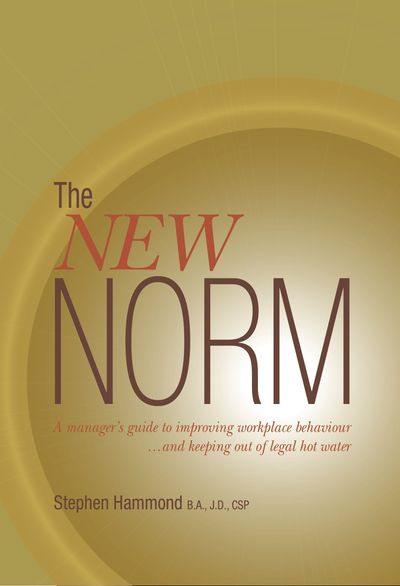Chapter twenty six
THE NEW NORM ensures his house is “clean”
Sam, Walter and Albert (their real names were not given) worked as technicians for Bell Technical Solutions in Peterborough, Ontario. On October 5, 2010 all three were seriously disciplined due to inappropriate Facebook postings they made about their company and/or one of their work-centre managers, Bob. Almost two years later, a labour arbitrator upheld the five-day suspension the company gave to Sam and the termination of employment it gave to Walter.
The arbitrator believed that Sam warranted no more than five days because his postings about Bob weren’t as offensive as the others, the postings never involved the company and he was much more co-operative in discussing the issue with management.
Walter’s termination was upheld because he posted offensive comments about Bob and the company over a ten-month period and denied doing so even when confronted with evidence of his actions. Also, Walter had worked with Bell for less than eighteen months.
When it came to deciding the fate of the third technician, the arbitrator noted that Albert referred to Bob as a gorilla, included some insulting pictures of gorillas and suggested Bob had a bad temper.
The arbitrator said the gorilla postings were “clearly insolent and derogatory to Bob” and noted that, like Walter (who’d been fired), Albert was uncooperative and defiant at the two meetings leading up to his termination of employment. The arbitrator said both Albert and Walter “showed no acknowledgment of wrongdoing or remorse whatsoever,” but gave Albert another chance, as I’ll explain below.
It seems many people at Bell could have learned a thing or two by taking my Respectful Workplace online course. They could have avoided a lot of problems for themselves and their career by learning the basics to avoid workplace harassment, bullying and a toxic workplace.
No one should cheer when an employee loses his job in a case like this. Unless the employee is downright evil, it’s preferable that early stages of discipline allow him to learn from his mistakes instead.
The normal disciplinary process involves a verbal warning followed by a written warning, a suspension without pay and finally termination of employment. Of course, the discipline doesn’t have to start with a verbal warning; it can begin at any stage, including termination.
Let’s compare Albert’s case with Walter’s. Albert had many more years of service with no discipline on his file. Length of service should count for something, and in this case it worked in Albert’s favour. Then there is the issue of Albert’s posts. While Walter made derogatory comments about both the company and manager, Albert didn’t make any derogatory comments about the company itself.
Yet I think what really defines this case is Bob, the manager whose alleged behaviour precipitated the negativity of the three technicians in the first place.
When I was first called to the Bar, an established employment lawyer told me that employers need to be “clean.” In my head, I feel she intimated “squeaky clean” but that may be going too far. Employers are expected to be clean enough because after all, they have the resources and are expected to hire knowledgeable management to run the organization.
In this case, the company wasn’t “clean” enough because numerous employees testified about Bob being a grumpy boss (my word, not theirs). Evidently this was a significant factor in influencing the arbitrator to give Albert another chance.
Albert felt he was getting back at Bob, although this was clearly the wrong way to do it (on social media where everyone could read it). The company believed the employment relationship was irreparable and that Albert shouldn’t return to work, but the arbitrator felt otherwise. It’s not like Albert got away scot-free; he was given a one-year suspension without pay.
When it comes to discipline that is shy of termination, that’s about as big a penalty as you can get. The arbitrator wrote, “In view of his one-year disciplinary suspension, it will be imperative that Albert work in a cooperative, harmonious and productive manner with the company and its management staff and other employees.”
If Albert was smart, he learned his lesson. If the company was smart, it learned that if it wants to dish out tough discipline, it needs its employment “house” to be squeaky clean…or at least clean enough.
The OLD NORM
- manages any way he wants, not caring if his style is grumpy or in any way negative.
- doesn’t rely on tried-and-true, employee-relation approaches that involve coaching employees and disciplining them only when needed.
- enjoys his reputation for being a “tough guy,” not realizing that employees tend to accept tough or firm managers only if they are also fair.
- doesn’t have a “clean” workplace.
The NEW NORM
- builds a reputation for being firm but fair because that’s his style.
- learned a thing or two from her parents, who perhaps said, “You can catch more flies with honey than vinegar.”
- knows there will be times employees need discipline and is ready to administer it appropriately, taking all the circumstances into consideration, including his own actions.
- maintains a “clean” workplace or tries to manage people in a way that will withstand reasonable scrutiny.
Suggestions for the New Norm:
01
You’re allowed your own style. A few days ago, some friends of mine were talking about people we all know who left a job because of a mean boss. It boggles the mind that when you pay people well and put them in senior positions, they can still get away with being grumpy managers. Perhaps they learned that grumpy style from previous bosses and thought it was the only way to go? No one has to be Glinda the Good Witch from the Wizard of Oz. But supervisors can be themselves without being grumpy or lashing out at employees.
02
Allow employees to talk openly. If you don’t know that your supervisory skills are turning good people off, then someone needs to tell you. If you create a workplace where people feel free to speak openly and honestly, you don’t have to worry about being perfect, because people will tell you when you slip up. Don’t look for perfection. Try your best and let people speak their minds. You don’t always have to take their advice, but at least you’ll hear it.
03
Follow established progressive discipline routines. The goal is to administer just enough discipline to influence an employee’s change of behaviour.
This chapter lets you know employees and managers need to have a “clean” workplace, free of harassment, bullying and discrimination. If you want more examples where management should have known better, by using simple investigation skills, consider reading
Chapter 31: The New Norm doesn’t pad a case to favour a complaint.
Purchase a copy of The New Norm, or if you think all your supervisors and managers, could learn many valuable lessons about creating a respectful workplace, free of harassment, bullying and discrimination, you can get volume discounts.
What one reader has to say about Stephen’s book, The New Norm
“When I got up early this morning and headed for my computer here at home, I told myself, ‘Just skim read a few sections of Stephen’s book and get a note back to him.’ I couldn’t do that, Stephen. I read it all – every word. You have taken too long to write this book – Employees and Employers in Canada need to read this.
Stephen will capture your attention in highlighting up to date and interesting headlines which we all have an opportunity to learn from. If you believe you can simply skim read this book, think again! The mesmerizing case studies will leave you yearning to learn the conclusion as any great author should do for their readers. Sincere attention to the messages here can only result in best practices within Canadian workplaces.”
Melinda Heidsma
Executive Director, AiMHi, Prince George Association for Community Living

Respectful Workplace Online Training Course
If you, your employees or your managers want more information,
sign up for my new online training course:
The Respectful Workplace in Canada.
With 10 modules of useful, relevant and current information,
this course can help everyone at your workplace.
This may be the best online harassment training your people will get.
Stephen Hammond is a lawyer turned speaker and consultant in the field of harassment, sexual harassment, bullying and discrimination at work.
The New Norm is Stephen’s third book.
Here’s more information about Stephen.



